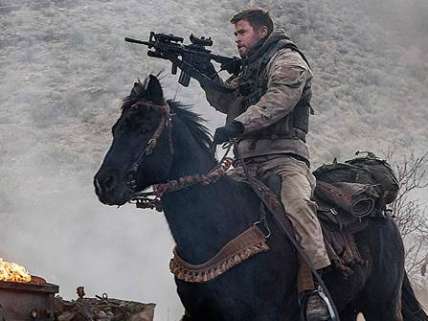Movie Review: 12 Strong
Chris Hemsworth, Michael Shannon and Michael Peña in a story of 9/11 payback.

The visual hook for 12 Strong, a first feature by onetime war-zone photojournalist Nicolai Fuglsig, is a poster photo of a group of soldiers—clearly modern in their desert-camo fatigues, complicated assault rifles at the ready—mounted on horses and loping our way as a big Chinook battle chopper rises out of a cloud of dust behind them. The equine anachronism is mildly arresting—what fresh Wild West could this be? But we quickly find out—it's actually Wild Middle East—and then settle in for what turns out to be a well-made, old-fashioned war movie with an appealing cast and, as you'd hope from any movie in which the name Bruckheimer crops up in the credits, a buttload of head-snapping, blood-spurting, building-flattening action. In other words, there's a lot to like here! Unfortunately, it's not quite enough.
Our "horse soldiers" (the title of the true-story Doug Stanton book on which the movie is based) are a team of 12 Special Forces veterans who've volunteered, in the immediate aftermath of the 9/11 attacks, to strike the first counterpunch against the loathsome Taliban and their Al Qaeda associates, currently infesting the rubbly wastes of Afghanistan. The movie has no interest in sifting through the politics of this period (thank you Lord); nor is it much concerned with more than four of the team's members: strikingly godlike Captain Mitch Nelson (Chris Hemsworth); his right-hand man, a warrant officer named Hal Spencer (Michael Shannon—exactly the kind of grim-eyed guy anyone would want to seek revenge with); and two combat-seasoned sergeants, Sam Diller (Michael Peña) and Ben Milo (Trevante Rhodes, of Moonlight).
The movie laughs in the face of cliché. After a compact history of jihadi attacks on American lives and property, from the first assault on New York's World Trade Center in 1993 to the second one eight years later, we meet the soldiers as they prepare to depart for battle. It's a melancholy business, of course, although Nelson's wife (played by Elsa Pataky, Hemsworth's actual wife) is totally stiff-upper-lip about it. ("I'm a soldier's wife," she says, "and I've been lucky.") Other spouses aren't so sanguine.
Once assembled, the team is informed by a bald-headed, baggy-eyed colonel named Mulholland (a disconcertingly corpselike William Fichtner) that they're headed for Uzbekistan, from which they'll be infiltrated into neighboring Afghanistan. Their mission: to hook up with a General Dostum (Navid Negahban), one of the many fractious warlords of the country's rebellious Northern Alliance, then proceed with him to the Taliban stronghold of Mazar-i-Sharif and assist him in destroying it, or at least them. Since the craggy Afghan landscape rules out modern transport, their journey will be undertaken on horses and donkeys—no problem for Nelson, who grew up on a ranch or something, but a major pain for the rest of the team. Nevertheless, off they go.
From this point, the movie devolves into a meditation on various ways to drop a jihadi. Rifle fire works well whenever the wily buggers step out from concealment behind the country's abundant supply of rockpiles; but calling in air support to deliver death-from-above is more efficient, and, frankly, more gratifying. Over the course of two hours and 10 minutes, we see a lot of bad-guy turbans retired, bullets taking them out in the modern cinematic manner, with attendant gushes of blood.
There are possibly way too many of these firefights—they do begin to grow tedious. But the movie sustains Why We Fight momentum with jolts of atrocity: a passing glimpse of a video in which a pregnant woman is being stoned to death, and a scene in which a village schoolteacher who attempted to educate little girls is shot in the head in front of her students by a Koran-waving Taliban fanatic (the movie's default villain throughout, played by black-bearded Numan Acar, who'd be a shoo-in for the role of evil vizier in any future remake of The Thief of Baghdad).
The picture has some notable virtues. Thanks to the chemistry of the lead actors, we get a rich sense of trash-talking military camaraderie. And there are interesting practical details: No saluting in field encampments, for example—it slaps a target on officers for any snipers who might be watching. Also, when you find yourself riding a horse along a high ridge, never look down into the gaping chasm—the horse'll take your body-weight shift as a signal to make a turn (into thin air). Good to know!
Despite the movie's high level of craft (especially in its soundtrack, which expertly mixes the clatter of battle with a deep moan of massed brass) and its general likability, it's inevitably unsatisfying. Although its subject would seem to have built-in excitement—a righteous-minded assault on the 9/11 malefactors sheltering in Afghanistan—it's deflatingly open-ended. If only the attack could have been an in-and-out operation—now that would have been satisfying. But no—after 16-plus years, we're still there.


Show Comments (31)